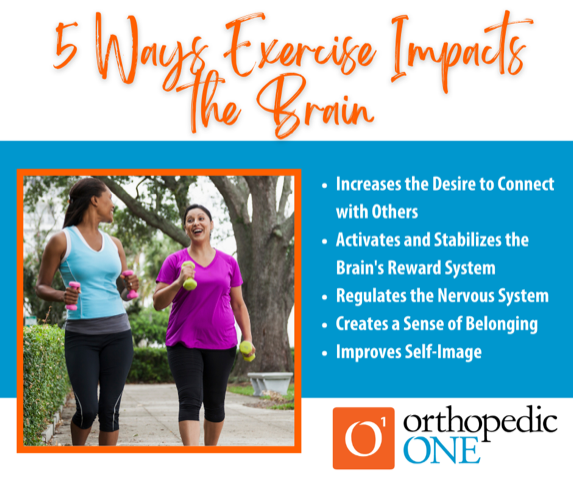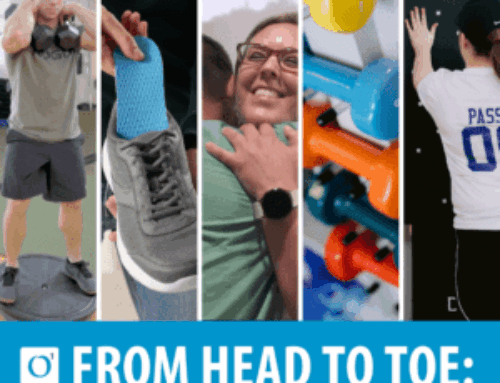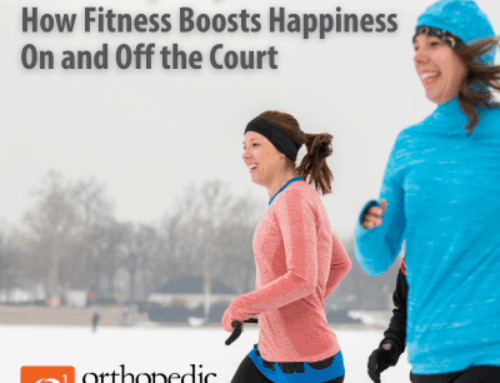Orthopedic ONE Sports Medicine Corner
Orthopedic ONE is proud to be the official Sports Medicine Partner of Elysium Tennis. Each month we will provide tips and tricks to help keep you active and healthy so you can be your best on the court! Look for more specific injury and nutrition-related topics in future newsletters!
5 Ways Exercise Impacts the Brain
It’s no secret that exercise is a vital part of physical health. It positively impacts the heart, lungs, muscles, and bones and helps prevent diseases. But do you know the link between feelings of connection, happiness, hope, courage, positive self-image, and physical movement? If you feel stressed or anxious amid the hustle and bustle of the season, incorporate movement into your holiday routine to reap the benefits exercise has on mental health and well-being!
The Exercise “High” Increases the Desire to Connect with Others
Studies show exercise helps unlock endocannabinoids. Known as the “don’t worry, be happy” chemicals in the brain, commonly called a “runner’s high”. However, this feeling can be experienced during any sustained physical activity.
The amygdala and prefrontal cortex regulate the brain’s stress response. They are rich in receptors sensitive to endocannabinoids, and when they collide, they reduce anxiety and produce feelings of contentment. Another byproduct of this connection is an increased desire to be around others. This explains the closeness people feel to those they exercise with and why couples or families should consider exercising together!
Exercise Activates and Stabilizes the Brain’s Reward System
Exercise activates the brain’s reward system, which is associated with feelings of pleasure, motivation, hope, and joy. As we age, we can lose dopamine receptors at a rate of 13 percent every ten years. The good news is regular exercise helps offset that decline by remodeling the brain’s reward system, resulting in both higher levels of dopamine and increased dopamine receptors.
Exercise Regulates the Nervous System and Shows Us We Are Brave
While parts of the brain experience the benefits of activating the reward system during exercise, other areas of the brain benefit from neural connections that help calm anxiety. In fact, participating in regular workouts can help balance the nervous system and reduce the regularity of the brain going into “fight or flight” mode.
Additionally, the brain makes sense of physical actions. So, when we face physical adversity during a workout and push through those obstacles, we internalize that we possess bravery, strength, and perseverance.
Group Exercise Creates a Sense of Belonging
Exercising with others is a powerful way to experience joy. Psychologists believe this is because moving in the same way, and at the same time, as others releases endorphins. These chemicals make us feel good, increase pain tolerance, and help promote bonding and trust. This often happens in group fitness classes and team sports when people report experiencing closeness with those near them as their heart rate increases. Breathing in unison (like in a yoga class) can also create this feeling.
Exercise Can Improve Self-Image
We hold value in physical accomplishments, and they play a role in how we perceive ourselves. When being active, our sense of self is connected to the movements we make. By performing motions that require grace, strength, or speed, the brain processes these movements and internalizes our ability to possess these attributes. Down the road, the mind can draw on these experiences during times we feel weak, awkward, or incapable and remind ourselves we possess these traits.
The impacts of exercise on our physiological, physical, and social health are indisputable. The next time you are in need of a little pick-me-up, consider taking time break a sweat. Your mind, body, and spirit will thank you!
Source: The Joy of Movement: How Exercise Helps Us Find Happiness, Hope, Connection, and Courage, by Kelly McGonigal, Ph.D.
Orthopedic ONE Sports Medicine Services
Onsite Clinic Hours: Jillian Measley, ATC, LAT, serves as Elysium Tennis’ dedicated Certified Athletic Trainer. She holds weekly walk-in clinic hours at Elysium on Tuesdays







